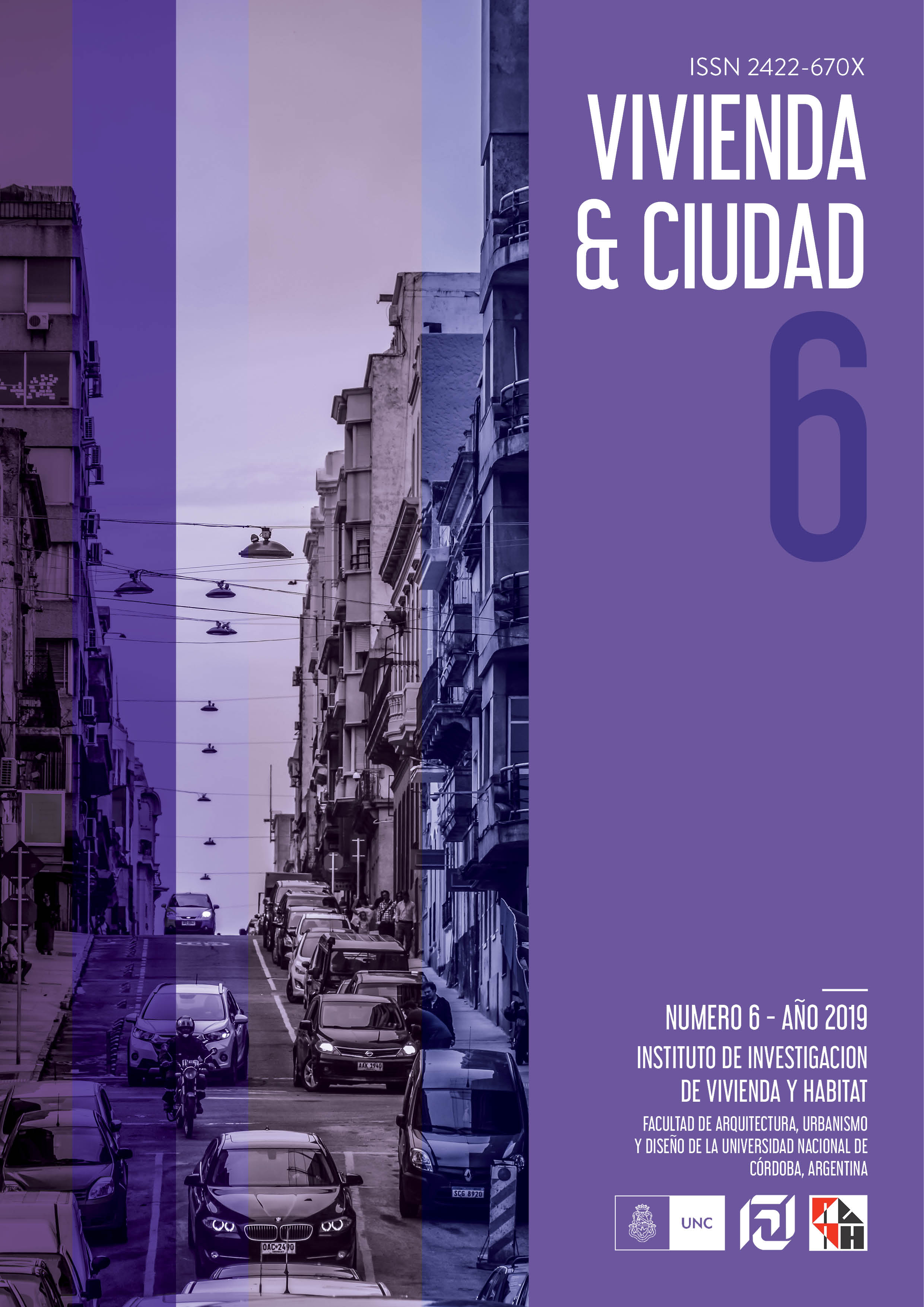The common in question: brief reflection on contemporary spatial transformations in the Córdoba mountain range.
Keywords:
Córdoba Highland territory, territorial production logics, disputes over common goods, society-nature, eco-feminismsAbstract
The forms of space production within the framework of neoliberal urbanism generate multiple transformations of territories. In the case of the mountain towns of Córdoba we find that since the last decade the use of land has been intensified with modalities that overlap dissimilar and often incompatible productivities, which result in socio-environmental problems and conflicts of various kinds. These processes, which are also expressed in other regions of Our America, highlight the crisis of the patriarchal capitalist development model applied to space production, placing the fragmentary treatment of the society/culture-nature relationship at the centre of debate.
The problematisation of this binomial is related to the tensions that are manifested when territorialising through incompatible perspectives with the guarantee of the material bases that sustain life, turning territories into fields of dispute. In times when cities consume huge amounts of resources based on a linear economic-productive matrix, the extension of low-density urbanisations means the attack over the natural areas where many of those resources that allow their operation come (water, food, energy, oxygen, etc.), putting their integral sustainability at risk. In that sense, the socio-environmental dimension acquires a unique role around local and/or regional issues. It is in the interest of this presentation, therefore, to make a reading of the division of the society/culture-nature binomial in order to understand the power patterns that operate in the contemporary spatial production of the Córdoba Mountain Range, while recognising some alternative proposals that emerge from territorial struggle and defense processes. We consider the mountain case can shed a light on reflections on the need to implement the relational dimension of habitat in the processes of spatial production in times of deepening in the socio-ecological crisis.
References
De Mattos, C (2008). Globalización, negocios inmobiliarios y mercantilización del desarrollo urbano. Producción inmobiliaria y reestructuración metropolitana en América Latina, vol. 11.
Escobar, A. (2014). Sentipensar con la tierra. Nuevas lecturas sobre desarrollo, territorio y Diferencia. Medellín: Ediciones UNAULA.
Escobar, A. (2016). Autonomía y diseño: la realización de lo comunal. Popayán: Universidad del Cauca.
Gargallo, F. (2012). Feminismos desde Abya Yala. Ideas y proposiciones de las mujeres de 607 pueblos en nuestra América.México: Corte y Confección. Recuperado de: http://francescagargallo.wordpress.com/
Gonçalves, W. (2016). Entrevista a Carlos Walter Porto-Gonçalves. Estamos ante un otro léxico teórico-político de lucha y de la izquierda. Crítica y Resistencias. Revista de conflictos sociales latinoamericanos, 2, 210-221, editada por el Colectivo de Investigación El Llano en Llamas. ISSN: 2525-0841.
Harvey, D. (2004). El nuevo imperialismo: Acumulación por desposesión. Socialist Register. bibliotecavirtual.clacso.org.ar/ar/libros/social/harvey.pdf.
Harvey, D. (2014). Diecisiete contradicciones y el fin del capitalismo. 1ª. Edición, Editorial IAEN, Quito
Herrero, Y; pacual, M.; Gonzales Reyes, M. (2018). La vida en el centro. Voces y relatos ecofeministas. Ecologistas en acción: Madrid.
Herrero, Y. (2013). “Miradas ecofeministas para transitar a un mundo justo y sostenible”. En: Revista de Economía Crítica, nº16, segundo semestre 2013, ISNN 2013-5254. p.278-307. Recuperado de: https://dialnet.unirioja.es/servlet/articulo?codigo=4524506
Hopkins, R. (2010). The Transition Handbook: From Oil Dependency to Local Resilience. White River Junction, VT, Chelsea Green Publishing.
Irwin, T. (2015). Transition Design: A Proposal for a New Era of Design Practice, Study & Research. Manuscrito no publicado, programa del School of Design, Carnegie Mellon University. Diponible en: www.transition.design.org.
Manzini, E. (2015). Cuando todos diseñan. Introducción al diseño para la innovación social. Madrid: Experimenta
Mattioli, D. (2018). Territorialidades emergentes. Agenciamientos colaborativos para el diseño de transiciones en el campo del hábitat. Tesis doctoral inédita. Universidad Nacional de Córdoba, Facultad de Arquitectura Urbanismo y Diseño. Doctorado en Arquitectura y Urbanismo.
Pengue, W (2017). Agroecología y Urbanismo en el siglo XXI: Hacia la generación de Escudos Verdes Productivos en los Pueblos y Ciudades de la Argentina. Revista Frontera.
Pintos, P (2016). Extractivismo inmobiliario y vulneración de bienes comunes en la cuenca baja del río Luján en Vásquez Duplat, M. (comp). Extractivismo urbano. Debates para una construcción colectiva de las ciudades. Fundación Rosa Luxemburgo, Centro de Estudios y Acción por la Igualdad. El Colectivo, Buenos Aires, 2017.
Santos, B. (febrero, 2018). “La nueva tesis once”. Nota de Opinión en Diario digital: Página 12. Recuperado de: https://www.pagina12.com.ar/96589-la-nueva-tesis-once
Sassen, S. (2000). Elementos teóricos y metodológicos para el estudio de la ciudad global. Original en inglés. Traducido por Venus Guerra, corregido y aprobado por la autora. Ecuador: Flacso.
Svampa, M. y Viale, E. (2014). Maldesarrollo. La Argentina del extractivismo y el despojo. Buenos Aires: Katz. ISBN: 978-987-1566-92-1.
Svampa, M. (2019). Las fronteras del neoextractivismo en América Latina. Conflictos socioambientales, giro ecoterritorial y nuevas dependencias. Calas: Guadalajara, México. Recuperado de: http://calas.lat/sites/default/files/svampa_neoextractivismo.pdf
Theodore, P. y Brenner (2009). Urbanismo neoliberal: la ciudad y el imperio de los mercados. Temas Sociales: Ediciones SUR. Vol. 66.
Páginas web:
https://elpais.com/elpais/2019/06/11/ciencia/1560273177_108414.html
Downloads
Published
Issue
Section
License
Authors who publish in this journal agree to the following terms:
a. Authors retain copyright and guarantee to the journal the right to be the first publication of the work as well as licensed under a Creative Commons Attribution-ShareAlike 4 license.
b. Authors may separately establish additional agreements for non-exclusive distribution of the version of the work published in the journal (e.g., placing it in an institutional repository or publishing it in a book), with an acknowledgement of its initial publication in this journal.
c. Authors are permitted and encouraged to disseminate their work electronically (e.g., in institutional repositories or on their own website) before and during the submission process, as this may result in productive exchanges, as well as earlier and greater citation of published work (See The Effect of Open Access).
d. 4.0 International Creative Commons Attribution-ShareAlike 4.0 License.










